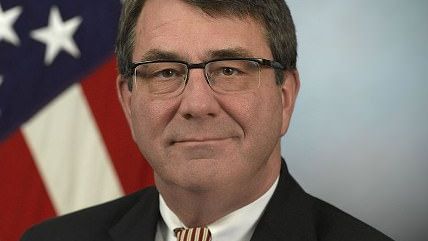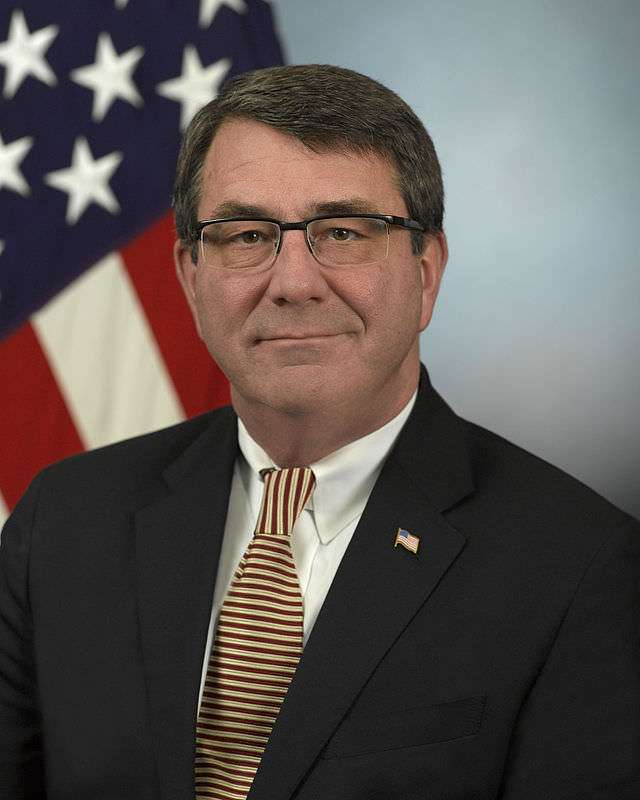Obama's Choice for Defense Secretary Favors Possible Military Response in Iran, More Spending


Former Deputy Secretary of Defense Ashton Carter is President Barack Obama's official choice to replace Chuck Hagel. Though leaked earlier, the formal announcement came today at a White House ceremony. Here's how USA Today describes his background:
From 2009 to 2011, Carter — a Yale graduate with a degree in physics — worked as undersecretary for acquisition, where he supervised the procurement of equipment to meet emerging threats.
Before he left the Pentagon, Carter was the military's top weapons' buyer and pushed hard for gear that troops needed to stay alive on the battlefields in Iraq and Afghanistan: Mine Resistant Ambush Protected (MRAP) vehicles to protect them from roadside bombs, surveillance equipment to spy on insurgents and bomb-sniffing dogs to find the buried mines that killed and maimed troops on foot patrols.
Regarded as smart, capable, and wonkish, Carter also led the Pentagon review of its budget with a look toward cuts.
That's one way to describe his attitude toward the Pentagon's budget cuts. If you are skeptical that the guy in charge of buying stuff for the military was all about fiscal responsibility, the progressive peaceniks over at Institute for Policy Studies have a counter-narrative. Carter helped perpetuate the nonsense that the sequestration cuts were devastating to the Department of Defense:
Carter used his Pentagon perch to publicly criticize mandated defense budget cuts provided in the 2011 Budget Control Act. In an op-ed for Defense One, Carter argued that sequestration forced "deep, essentially mindless, additional cuts in the defense budget." He argued that the defense department will be "driven to make inefficient and unsound near term funding choices that will reduce our buying power" and harm "our readiness."
And yet, we keep handing over that military equipment Carter bought to our police departments. As folks like Nick Gillespie and Veronique de Rugy noted about the sequestration last year at this time, those cuts only slowed the massive growth of defense spending. Refresh your memory here.
In Institute notes that Carter is a big advocate against nuclear proliferation and advocates the use of force if necessary. That may get him through some of the warhawk conservatives in the Senate. He contributed to a report that pushed for consideration of potential military strikes against Iran. The Institute's analysis of the report:
[I]f the new administration agrees to hold direct talks with Tehran without insisting that the country first cease enrichment activities, it should set a pre-determined compliance deadline and be prepared to apply increasingly harsh repercussions if the deadlines are not met, leading ultimately to U.S. military strikes that would "have to target not only Iran's nuclear infrastructure, but also its conventional military infrastructure in order to suppress an Iranian response."
That was a report written by several parties. In a different report from 2008, Carter expressed concerns that military strikes on Iran might not actually stop nuclear proliferation. But reading through the report, he really means that only military strikes won't work, which I don't think is anybody's plan, not even Sen. John "Bomb, bomb, bomb … bomb, bomb Iran" McCain's. Carter instead discusses a containment strategy that uses the possibility of military force to contribute to pressure against Iran to give up its nuclear ambitions:
The alternative to the diplomatic table, broadly speaking, is a strategy of containment and punishment of an Iran that ultimately proceeds with its nuclear program. A variety of military measures—air assault, blockade, encirclement, and deterrence—could be elements of such a containment strategy.
